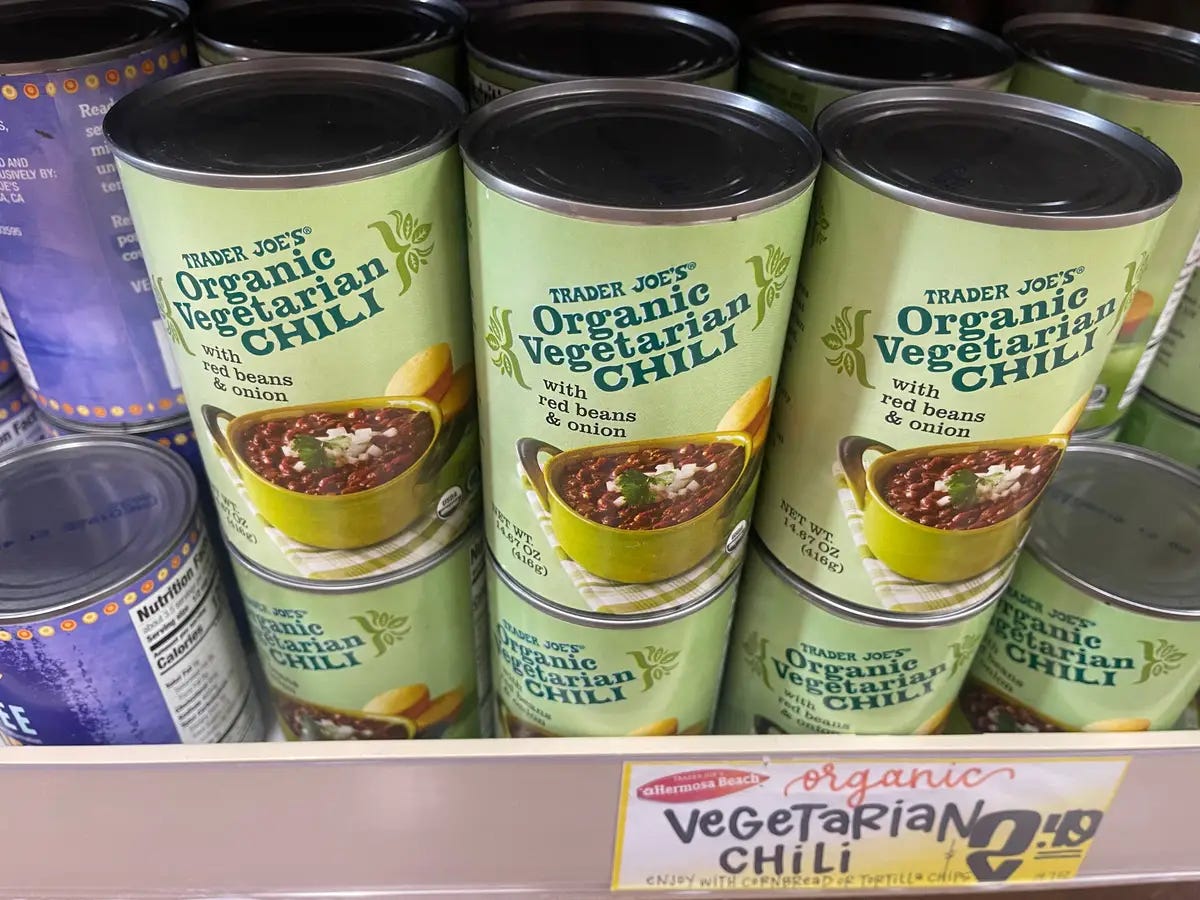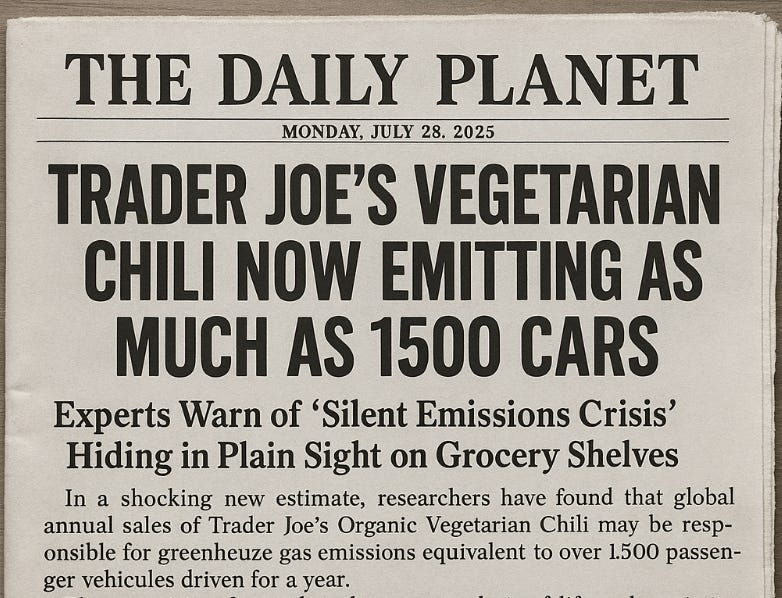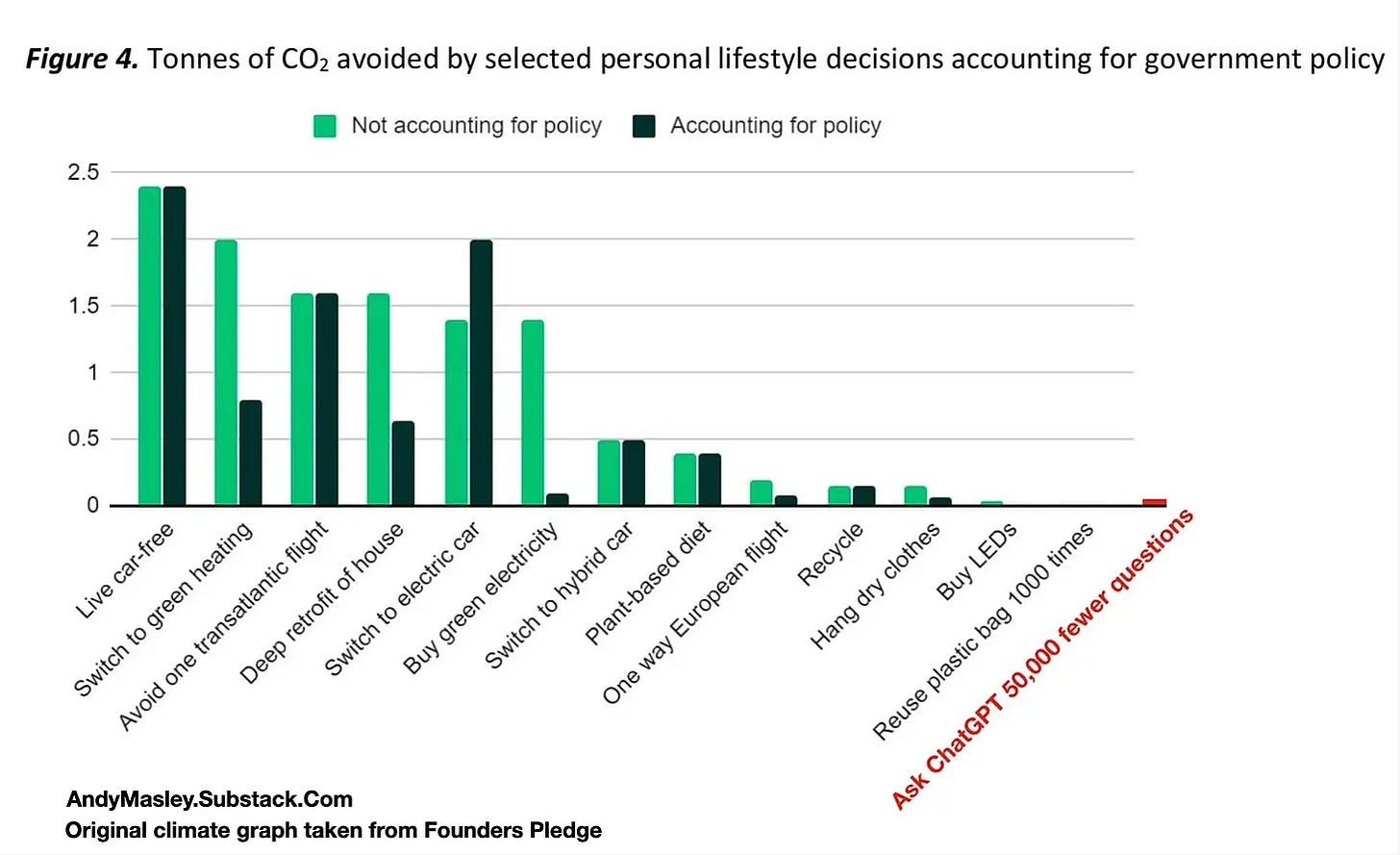My can of soup example of bad climate communication
Would you condemn my vegan chili?
There are a few common bad ways of talking about problems in climate change that have bothered me since I was a teenager, and that keep popping up together in conversations about ChatGPT and the environment. I wrote out an example of what they look like, and the rules we should follow to avoid them.
The can of soup example
Canned chili is a staple of lazy vegan diets. I get mine from Trader Joe’s.
One day I’m walking in Trader Joe’s, and I see the cans of chili. As I reach for one, the person standing next to me stops me and says “Hey, you should know that this chili is really bad for the climate.”
Me: Wait what? Why?
Person: Well, first of all, each can of Trader Joe’s Vegetarian Chili emits about ten times as much as an apple1, so you’re already massively increasing your dietary emissions compared to what you could be eating.
Me: Well yeah… but I don’t think apples and chili are really comparable. They serve different purposes, and aren’t both of these foods just incredibly low emissions compared to, like… most meat? There’s a lot of stuff I could be eating that would be way higher emissions than this.
Person: Sure, but that’s a bad way to think about climate change. You shouldn’t focus so much on your individual carbon footprint. We need to think of it as a collective action problem. Your individual purchase of the chili may seem small, but collectively this chili is having a huge impact. Every year, the production of Trader Joe’s Organic Vegetarian Chili emits as much as 1500 cars.2 By buying this, you’re participating in that huge increase in emissions. We need to let consumers know about what they’re buying. They deserve transparency.
Me: 1500 cars does sound like a lot… but wait, doesn’t this basically apply to all food that we eat, because there are just so many people buying it that it will add up to a lot of emissions no matter what I choose? That’s just the nature of living in a large society. Like, why aren’t you telling me not to buy the tomato soup?
Person: Well I haven’t looked into tomato soup. I just think consumers deserve transparency about the chili.
Me: Okay, so… like what would you say if I bought the tomato soup?
Person: I’m not going to tell you how to live your life in areas I know less about. My area of expertise is in the vegetarian chili, and I know it emits a lot.
Me: Well hmmm… I just did this back of the envelope calculation and it seems like most food in this store actually emits way more than the chili. If anything shouldn’t we be encouraging people to buy more chili and less meat?
Person: Whoa whoa, you’re not an expert on this. You can’t make those kinds of claims.
Me: Uh… this doesn’t seem that complicated actually. Like if I were actually going against some complex scientific consensus here that’d be concerning, but I’m basically just doing exactly what you’re doing and just following the numbers.
Person: Why do you feel so defensive about your chili? It might just be that you like it and want to eat it. The fact that’s it’s emitting as much as 1500 cars doesn’t seem to bother you.
Me: Well yeah I like it but… that doesn’t really matter here? These numbers are all pretty straightforward. It seems like you’re missing something about how we should think about climate that I’m having trouble putting my finger on.
Person: Honestly the chili’s inherently bad for the climate no matter how little it emits, because I don’t like the taste at all. It’s bland. Basically slop… Why waste emissions on something that’s net bad for the world?
Me: Well I like it personally, can’t I just be allowed to consume something I personally like if the emissions are low enough in my personal carbon footprint?
Person: Well again, the idea of a personal carbon footprint was basically made up by oil execs to distract you from collective action. If you look at how this chili is affecting the climate collectively, you’d agree you need to stop eating it. 1500 cars is far from nothing. Also, this is just one small part of the massive global soup industry. Collectively, all global soup consumption is emitting as much as a whole mid-sized country like Sri Lanka3.
Me: Hmmmm.
Why is this wrong?
The person in this example is clearly wrong. The reason is that they broke three core rules I think are really important for conversations about climate:
Rule 1: We shouldn’t make comparisons between global use of something and an individual person’s emissions.
Statistics like “It emits as much as 1500 cars” compares something the entire population of America does (buying Trader Joe’s soups) to something you personally do (driving a car). This is basically always going to be very misleading, because literally everything looks large by the standards of an individual if you look at the results of everyone doing it. Instead, to find what’s actually worst for the climate, we need to compare one collective behavior to another collective behavior, not a collective behavior to an individual behavior. Soup is technically a “significant contributor to climate change” in that it emits as much as whole countries, but it’s massively dwarfed by other societal problems if we just compare it to other things we collectively consume.
This specifically is I think the most common significant sin in climate communication. It happens all the time. All numbers involved in climate change are huge, even the emissions of soup, so it’s always easy to report anything we’re doing as a very large amount of CO2. Don’t fall for this! Never accept a context free number of CO2 emissions. Even a claim that something emits as much as “a mid-sized country.” Many common things we do that are fine for the climate (including eating soup) do this! Push the person to explain how this fits in the broader picture of what we emit in total, and how much we need to reduce our overall emissions.
Rule 2: We can’t look at our consumption choices in a vacuum. We need to compare them to other ways people could be consuming resources.
The person was singling out the vegetarian chili for no reason. They learned a lot about it without bothering to learn how it compares to other common things we do, except for a single statistic about it being ten times as bad as an apple. This doesn’t work for thinking about climate change. People have many many many ways they can spend their time. They can go on a walk, or fly across the ocean, or watch a movie, or eat meat, or a veggie burger. Simply singling out one activity as bad without actually comparing it to other ways people could be spending their time is more or less exactly like singling out one very specific type of soup at Trader Joe’s, being very vocal about its net emissions, and not bothering to look into the emissions of the other soups (or the rest of the food at the store, or at other stores). Thinking this way basically gives us no useful information on what to actually cut to reduce our collective emissions the most. It can cause people to freak out about individual activities that are fine for the climate and basically identical to every other normal thing we do.
Rule 3: If collective consumption choices matter, individual consumption choices matter.
Fortunately, if we want to change our collective behavior, our emissions are in some ways the sum total of our individual emissions, so individual emissions can serve as a useful guide to where we can have the most collective impact. If you’re worried about what activities you do individually that are collectively harming the climate the most, the list is likely to be roughly in line with where you emit the most personally.
Some climate communicators will sometimes make a weird move, where they’ll start by saying “Oh, it’s a mistake to focus on your individual carbon footprint, it’s a distraction from collective action and systematic change.” I mostly agree with that, but then they’ll go on to say “Look, this individual activity you do is bad when you add up everyone doing it collectively.” I think the correct response here is “Well in that case your personal climate footprint is actually a reasonable guide to where we’re emitting the most collectively. I emit more by driving than in my diet, and that’s mirrored in the breakdown of America’s total emissions, so if I want to do collective action well, my individual emissions actually seem like a good guide for what I should cut.” However, some people in climate will still try to veto thinking about your individual emissions at all, because thinking about individual emissions feels tainted and wrong to them. This is silly, because all collective action problems are actually the result of individuals needing to coordinate their individual behavior. If you think collective action problems are real and matter, individual choices matter by definition!
Use this as a test
If you’re thinking about the climate impacts of any activity, ask if the way you’re thinking about it would condemn my vegan chili. If it does, something needs to change!
Emissions per can of chili:
Ingredients: Assume 0.42 kg chili × 1.5 kg CO₂e/kg food. CO2 per can = 0.63 kg.
Processing & cooking energy: assume factory thermal + electricity around 0.1 kg per can.
Packaging for steel can, label, and box: Emission factor of 1.9 kg/kg of steel. 0.005 kg of steel per can. 0.10 kg per can.
Freight to stores: ~0.1 kg/can.
Total: ~0.9 kg CO2 per can.
An apple’s carbon footprint is ~0.06 kg. Freight to stores seems pretty uncertain here and will determine a lot of the ratio.
Trader Joe’s has ~560 stores (US only, so “global” ≈ all sales). Assume average cans per store per day = 40 (plausible mid-point; range 20–80). Cans/year = 560 stores × 40 cans/day × 365 ≈ 8 million cans. 8 million x 0.9 kg CO2 per can = 7.2 million kg CO2 per year. US cars emit ~4.6 t CO2 per year. 7.2 million kg / 4.6 t = 1565.
I will add a botec proving this soon





I ate so much of the Trader Joe's chili that my roommates incorporated it into a forfeit in one of our drinking games.
Andy, fantastic! Long Live TJ's Veggie Chili!
On the very off chance that any of your readers don't already, everyone should read Hannah Ritchie. She has another great one out overnight.
Also, https://mattball.substack.com/p/carbon-cult-cruelty
What is the carbon footprint of self-promotion? ;-)